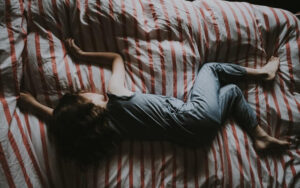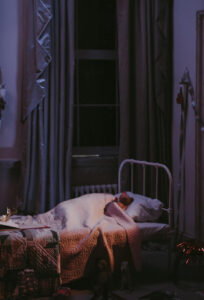
Table of Contents
Most children with autism experience some type of sleep problems due to sensory overload and other issues.
They often find sleeping on the floor more comforting than laying in bed. Read this article to find out why and learn more about products that can help your child sleep better.
Autistic Children and Sleeping Disorders
Sleeping disorders are much more common in children with autism spectrum disorder than in neurotypical children and those with other developmental disabilities. It is estimated that between 40% and 80% of all children on the spectrum experience sleep problems, including:
- Difficulties falling asleep
- Poor sleep quality
- Restlessness during night
- Waking frequently at night
- Sleepwalking and night terrors
- Sleep apnea
- Sleeping less than typical for the child’s age
- Waking up too early
- Daytime sleepiness.
It is unclear what causes such a high prevalence of sleep challenges among children with autism, but researchers believe that many issues come from sensory sensibilities typical for autism, in addition to several other factors, such as:
- Children with autism often have difficulties with social language and are not able to pick up on social cues that indicate when it’s bedtime.
- Some children on the autism spectrum have atypical circadian rhythms. They produce lower amounts of sleep-related hormone melatonin at night than neurotypical children.
- Gastrointestinal problems, asthma, epilepsy, and other commonly co-occurring conditions in children with autism may disrupt sleep.
- Increased levels of stress and anxiety, inability to relax, and ADHD can also cause insomnia in children on the spectrum.
Why Do Children With Autism Sleep on the Floor?
Some autistic children prefer to sleep on the floor instead of in their beds. This can be due to a number of factors:
Sensory processing disorder
Many children with autism have a sensory processing disorder (SPD). This means that they experience extreme sensitivities to external stimuli, including light, sounds, smell, and touch. If your child becomes overwhelmed by sensory stimuli, they won’t be able to get the sleep they need.
Your child may find bedding itchy or scratchy, which makes laying in bed extremely uncomfortable. The bed may also trigger sensory overload in your child because it feels too soft, too squishy, or not smooth enough. They may simply prefer how the floor feels against their skin.
The bed is too warm
The wrong temperature at bedtime can also disrupt your child’s sleep. If the bed gets too warm at night, your child may seek out the coldness of the floor for more comfort.
The floor just feels better
Your child may choose to sleep on the floor because it offers the sense of security that their bed can’t. A smooth, cool, and hard floor can be easier to deal with than a very soft bed. Laying on the floor can also help them feel more connected and grounded.
If your child struggles with sleep, there are many products that can help them fall asleep more easily and feel at ease in their bed.
8 Products That Help Autistic Children Sleep in Their Beds
Children on the autism spectrum meet many challenges and it’s essential that they get the right amount of quality sleep so that they can develop and grow. Here are some products that can improve your child’s sleep. Most of them are designed specifically for children with autism and other special needs.
Dreampad products
Dreampad offers a wide range of products to help your child fall asleep, from weighted blankets and support pillows to white noise machines. These products can help relieve anxiety and dysfunctions that may be preventing your child from getting a good night’s sleep.
Fidget toys
Fidget toys like this one provide the right amount of sensory input to help your child relax. This fidget pillow has lots of texture and easy tasks that your child can focus on before falling asleep.
Weighted blankets
Weighted blankets provide an even pressure across the child’s lap, chest, and shoulders to help them find calm. If your child’s anxiety gets worse around bedtime, a weighted blanket can offer the much-needed reassurance. This natural sleep aid will help your little one relax before bed, fall asleep faster, and stay asleep longer.
Sensory sheets
Sensory sheets are an alternative to weighted blankets, suitable for autistic kids of all ages who struggle with sleeping. The sheets provide adjustable compression and stress relieving support, while preventing the child from tossing and turning in the bed at night. Sensory sheets are comfortable, breathable, stretchy, easy to put on, and adjustable to suit your child’s comfort.
Sleepy Time pillow
The natural fragrance of these soothing pillows will provide relief from stress and anxiety and help your child relax. The pillows are filled with natural lavender flowers and flax seeds and come with a small bottle of lavender essential oil for re-scenting. You can also place them inside your child’s pillowcase for restful sleep.
Naturepedic Verse organic children’s mattress
This Naturepedic Verse mattress is one of the best mattresses for autistic children. It is made from organic materials that help eliminate toxins and reduce smells, which makes them suitable even for the most sensitive children. The individually encased coils minimize sounds, while the upper layer reduces pressure points that your child may find uncomfortable. These mattresses can be used both by younger and older autistic children.
Rohm portable white noise sound machine
Rohm compact portable white noise machine makes a soothing, consistent sound similar to that of a fan. It effectively masks disturbing noises, allowing your child to sleep better. This noise machine is suitable for everyday use as well as for traveling.
ZPod Autism Bed
ZPod beds are enclosed capsule beds specifically designed to create ideal sleeping conditions for children with autism. The beds feature intelligent lighting control, a white noise generator, air filters, room temperature and light control, and many other smart functions that will help your child sleep soundly through the night.
If you are ready to work with the best ABA therapy provider in New York or New Jersey, give us a call at (732) 402-0297. Our dedicated team is ready to help and we will treat you like family.
- Autism Triggers: What to Watch Out for - April 29, 2024
- Autism Stress Relievers and Calming Strategies - April 29, 2024
- Autism Routine Disruption Coping Strategies - April 28, 2024


